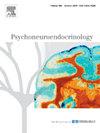Inflammatory signalling during the perinatal period: Implications for short- and long-term disease risk
IF 3.4
2区 医学
Q2 ENDOCRINOLOGY & METABOLISM
引用次数: 0
Abstract
During pregnancy and the postpartum, there are dynamic fluctuations in steroid and peptide hormone levels as well as inflammatory signalling. These changes are required for a healthy pregnancy and can persist well beyond the postpartum. Many of the same hormone and inflammatory signalling changes observed during the perinatal period also play a role in symptoms related to autoimmune disorders, psychiatric disorders, and perhaps neurodegenerative disease later in life. In this review, we outline hormonal and immunological shifts linked to pregnancy and the postpartum and discuss the possible role of these shifts in increasing psychiatric, neurodegenerative disease risk and autoimmune symptoms during and following pregnancy. Furthermore, we discuss how key variables such as the number of births (parity) and sex of the fetus can influence inflammatory signalling, and possibly future disease risk, but are not often studied. We conclude by discussing the importance of studying female experiences such as pregnancy and parenting on physiology and disease.
围产期的炎症信号:对短期和长期疾病风险的影响。
在孕期和产后,类固醇和肽类激素水平以及炎症信号都会发生动态波动。这些变化是健康妊娠所必需的,而且会持续到产后。在围产期观察到的激素和炎症信号变化中,有许多同样在与自身免疫性疾病、精神疾病以及日后的神经退行性疾病相关的症状中发挥作用。在这篇综述中,我们概述了与妊娠和产后有关的荷尔蒙和免疫学变化,并讨论了这些变化在增加妊娠期间和产后精神疾病、神经退行性疾病风险和自身免疫症状方面可能发挥的作用。此外,我们还讨论了分娩次数(奇偶性)和胎儿性别等关键变量如何影响炎症信号以及可能的未来疾病风险,但这些变量并不常被研究。最后,我们讨论了研究怀孕和育儿等女性经历对生理和疾病的影响的重要性。
本文章由计算机程序翻译,如有差异,请以英文原文为准。
求助全文
约1分钟内获得全文
求助全文
来源期刊

Psychoneuroendocrinology
医学-精神病学
CiteScore
7.40
自引率
8.10%
发文量
268
审稿时长
66 days
期刊介绍:
Psychoneuroendocrinology publishes papers dealing with the interrelated disciplines of psychology, neurobiology, endocrinology, immunology, neurology, and psychiatry, with an emphasis on multidisciplinary studies aiming at integrating these disciplines in terms of either basic research or clinical implications. One of the main goals is to understand how a variety of psychobiological factors interact in the expression of the stress response as it relates to the development and/or maintenance of neuropsychiatric illnesses.
 求助内容:
求助内容: 应助结果提醒方式:
应助结果提醒方式:


